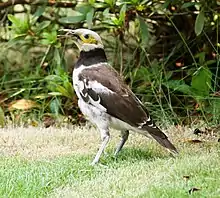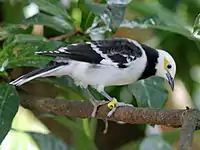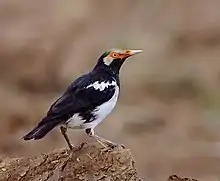Gracupica
Gracupica is a genus of Asian birds in the family Sturnidae. It is sometimes merged with Sturnus or Sturnia.
| Gracupica | |
|---|---|
 | |
| Black-collared starling (Gracupica nigricollis) | |
| Scientific classification | |
| Domain: | Eukaryota |
| Kingdom: | Animalia |
| Phylum: | Chordata |
| Clade: | Dinosauria |
| Class: | Aves |
| Order: | Passeriformes |
| Family: | Sturnidae |
| Genus: | Gracupica Lesson, 1831 |
| Type species | |
| Gracula melanoleuca[1] = Gracula nigricollis Lesson, 1831 | |
Taxonomy
The genus Gracupica was introduced in 1831 by the French naturalist René Lesson to accommodate the black-collared starling which is therefore the type species.[2][3] The genus name combines the Latin graculus meaning "jackdaw" with pica meaning "magpie".[4]
Species
The genus contains four species.[5]
| Image | Scientific name | Common Name | Distribution |
|---|---|---|---|
 | Gracupica nigricollis | Black-collared starling | Brunei, Cambodia, China, Laos, Myanmar, Thailand, and Vietnam |
 | Gracupica contra | Indian pied myna | Indian subcontinent |
 |
Gracupica floweri | Siamese pied myna | mainland Southeast Asia |
_on_feeder%252C_Gembira_Loka_Zoo%252C_Yogyakarta%252C_2015-03-15.jpg.webp) |
Gracupica jalla | Javan pied myna | southern Sumatra, Java, and Bali |
A 2021 study found that G. contra represents a species complex of 3 distinct species formerly thought to be subspecies of G. contra: the Indian pied myna (G. contra sensu stricto) from most of the Indian Subcontinent, Myanmar, and Yunnan in China; the Siamese pied myna (G. floweri) from Thailand and Cambodia, and the possibly extinct in the wild Javan pied myna (G. jalla), historically known from Java and Bali in Indonesia.[6] The International Ornithological Congress has accepted these results.[7]
References
- "Sturnidae". aviansystematics.org. The Trust for Avian Systematics. Retrieved 2023-07-15.
- Lesson, René (1831). Traité d'Ornithologie, ou Tableau Méthodique (in French). Paris: F.G. Levrault. p. 401 (livraison 6). Published in 8 livraisons between 1830 and 1831. For the publication date see: Dickinson, E.C.; Overstreet, L.K.; Dowsett, R.J.; Bruce, M.D. (2011). Priority! The Dating of Scientific Names in Ornithology: a Directory to the literature and its reviewers. Northampton, UK: Aves Press. p. 119. ISBN 978-0-9568611-1-5.
- Mayr, Ernst; Greenway, James C. Jr, eds. (1962). Check-list of Birds of the World. Vol. 15. Cambridge, Massachusetts: Museum of Comparative Zoology. p. 104.
- Jobling, James A. (2010). The Helm Dictionary of Scientific Bird Names. London: Christopher Helm. p. 176. ISBN 978-1-4081-2501-4.
- Gill, Frank; Donsker, David; Rasmussen, Pamela, eds. (July 2021). "Nuthatches, Wallcreeper, treecreepers, mockingbirds, starlings, oxpeckers". IOC World Bird List Version 11.2. International Ornithologists' Union. Retrieved 11 January 2022.
- Baveja, Pratibha; Garg, Kritika M.; Chattopadhyay, Balaji; Sadanandan, Keren R.; Prawiradilaga, Dewi M.; Yuda, Pramana; Lee, Jessica G. H.; Rheindt, Frank E. (2021). "Using historical genome-wide DNA to unravel the confused taxonomy in a songbird lineage that is extinct in the wild". Evolutionary Applications. 14 (3): 698–709. doi:10.1111/eva.13149. ISSN 1752-4571. PMC 7980273. PMID 33767745.
- "Taxonomic Updates – IOC World Bird List". Retrieved 2021-07-15.